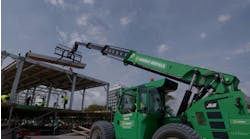Interview with Wacker Neuson’s Andrew Gastrow: Proper Application Assistance
RER: What are the latest products and developments in your company’s pump production?
Gastrow: Like all manufacturers, we are always updating machines to fit the market demand for quality and serviceability. In 2023, Wacker Neuson will pivot from OEM trash pump models back to its own tried and true industrial trash pump design, which will be manufactured by Wacker Neuson. The PT centrifugal trash pump design is known for its quality and durability and includes a shimmable volute.
RER: Are there any particular trends you expect to see in pump production in the coming years?
Gastrow: Possibly electrification of some sort that means full electric via battery-powered or partial electrification via pairing an engine with batteries. This trend, promoting quiet, zero emission power, is touching many different product segments in the construction industry, even ones where it may seem unlikely. But we have not seen this yet in the pump market.
RER: It seems that pump rentals -- as illustrated by the growing “specialty rental” segments of major rental companies – have grown a lot in recent years. Do you have any insight into why this growth has occurred?
Gastrow: Pumps are a great rental tool since they are commonly a seasonal or emergency tool. Many construction companies have limited knowledge in the proper setup and rely on their rental partner’s expertise for this. Rental companies have trained staff to offer strong guidance and proper application assistance as well as set up. Construction contractors usually deal with flooded jobsites only periodically and would rather rent than own for storage and maintenance reasons. Additionally, most homeowners do not need to own a pump since they are usually needed for emergency situations such as a flooded basement.
RER: In many types of construction machinery, especially earthmoving and aerial machines, lead times have increased significantly, as along as 18 months to two years in some cases, often caused by supply chain issues and the difficulty in obtaining certain components and materials. Are you finding the same issues in pump manufacturing?
Gastrow: We have not seen supply chain issues effect pumps as dramatically as compact and larger machines. Pumps require smaller pieces and less components and almost no electronics, so that also plays into it.
RER: Do you have any particular tips for pump rental companies to serve their customers better?
Gastrow: Training rental center personnel on proper pump applications including pump sizing and use relative to pump type, fluid type; trash = 20-percent solids, dewatering less than 10-percent solids, gallons per minute, head pressure, fluid temp, fluid pH, types of pumps and accessories are very important for rental center operations. Knowledgeable staff can recommend and rent the right pump for the application. This not only helps the customer get the most out of the pump for that job, but will protect the pump from being used incorrectly, which protects the rental center investment. Additionally, by knowing and understanding their market, the rental center can manage their inventory by stocking the pumps that will be in demand.






